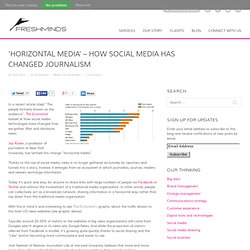

‘Horizontal media’ – how social media has changed journalism. In a recent article titled “The people formerly known as the audience”, The Economist looked at how social media technologies have changed how we gather, filter and distribute news.

Jay Rosen, a professor of journalism at New York University, has termed this change “horizontal media”. Thanks to the rise of social media, news is no longer gathered exclusively by reporters and turned into a story. Instead, it emerges from an ecosystem in which journalists, sources, readers and viewers exchange information. Today it’s quick and easy for anyone to share links with large numbers of people via Facebook or Twitter and without the involvement of a traditional media organisation. In other words, people can collectively act as a broadcast network, sharing information in a horizontal way rather than top down from the traditional media organisation. With this in mind it was interesting to see The Economist’s graphic about the traffic drivers to the main US news websites (see graphic above).
Learn About the People You're Emailing, as You Email Them. Inbox social intelligence startup Rapportive is making its Gmail add-on all the more useful Friday. The service's omnipotent message sidebar, which includes a bevy of social data on your email contacts, now appears as you compose your email messages. With the enhanced version of Rapportive, simply compose a message and enter an email address in the "to" field, just as you normally would, and Rapportive will look up the contact and display a host of information on the individual in the right-hand side bar. And, should you include multiple folks in a single email, Rapportive will look up each individual as you type their names. Rapportive's compose view is designed to help you, the email sender, construct better messages. The tool is also intended to help jog your memory and remind you who you're emailing, how you've communicated with contacts before and what they're chatting about on social networks.
Corporate. The Wealth Report. One of the most famous and funny Monty Python skits is the “Four Yorkshiremen.” Four cigar-smoking, tux-wearing swells recount their childhood and try to top each other with stories of hardship. One says he used to live in a single room with 26 others. “Eh, you were lucky to have a room! ,” says another. “We used to have to live in t’ corridor!”
“Oh, we used to dream of livin’ in a corridor!” The other responds, “Well, when I say ‘house’ it was only a hole in the ground covered by a sheet of tarpaulin, but it was a house to us.” ” We were evicted from our hole in the ground and we ‘ad to go live in a lake.” And so on… The Four Yorkshiremen provide an apt analogy for the populist, anti-privilege strain running through the presidential election. It started with Obama telling audiences that he wasn’t born rich – unlike Romney, who was. College? “And as you may know, contractors have financial difficulty from time to time.” And so on. But let’s get real.